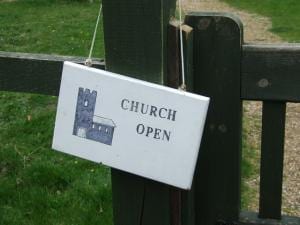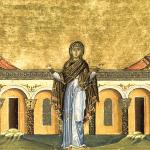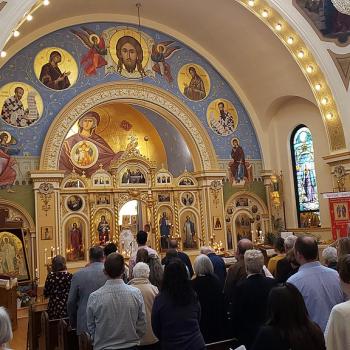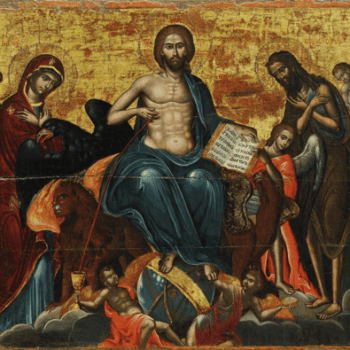
Trying to slow the spread of COVID-19 to manageable levels has brought much of the world to a standstill. Many, not understanding the measures being used to halt the spread of COVID-19, have demanded that the various lockdowns around the world to be lifted. Doing so too soon will be dangerous, and will likely result in another spike in COVID-19 cases. The fact that many states in the United States are slowly opening up before all the necessary resources needed to deal with COVID19 properly have been established, such as testing, vaccines, and effective treatments, suggests that we will have another death-spike in the near future.
Nonetheless, because various states are relaxing restrictions on the public, churches are going to begin wondering when they can be opened for public worship. Sadly, just as with the states, so it is likely with the churches, that the public will be welcomed too soon, and like before, COVID-19 will spread through churches, causing great pain and sorrow to the faithful.
It is inevitable that churches will one day again be open to the public. That, of course, is good. Churches should be open and the faithful should be able to go to their services when the pandemic is properly under control. But they should not open too soon, before proper care can be had to protect the faithful when they go to church. Sadly, many are demanding that churches be opened up, without regard to the consequences of what opening them up too soon would mean, and this will likely encourage many churches to open up sooner than they should.
When churches do open, it is likely COVID-19 will still be a threat. It might be under control. It might be that we have found some medical care which helps treat those who get sick. But it will still be a threat. Churches should take that into consideration and possibly change what they do while the threat remains.
These are some of my own thoughts and suggestions as to what can and should be done to minimize that threat
First, when churches first open up to the public, they should lower their maximum occupancy in order to continue proper social distancing.
Second, those traditions which place obligations on the faithful to go to particular liturgical celebrations should continue to dispense the faithful from those obligations for the foreseeable future. This will help keep people safe, especially those who are vulnerable or those who do not feel comfortable in a crowd so long as COVID-19 remains a threat. Perhaps the whole notion of obligation needs to be changed, and a reexamination of ancient Christian practices when the faithful could not frequently go to church services should be employed to suggest how this transformation could take place. Catholics have been led to have a legalistic mindset in regards obligations, but the mindset is itself new; perhaps they can look to the Orthodox and how the Orthodox view church attendance, which does not entirely remove the expectation that the faithful should come to liturgical services but is more flexible with what is required (and tries to avoid a simply legalistic attitude).
Third, churches should avoid activities which require direct contact between people. They might be able to consider new ways to engage those activities in order to keep to their spirit while avoiding the dangers associated with them. Thus, the sign of peace in modern Roman Catholic liturgies could continue to be given but it could be done in a new fashion: instead of shaking hands while wishing peace upon each other, the faithful could do some other action, like a bow, which would demonstrate the same level of respect and honor intended with the shaking of hands but do so at a safe distance, limiting dangerous contact between people.
Fourth, the distribution of communion must continue to be done with respect to the threat of COVID-19. This means, those forms of distribution which are more likely to spread the virus will have to be stopped, such as communion on the tongue. The church has a long history of changing the way it distributes communion to the needs of the time. Communion was received by the hand early on, and indeed, not just in the hand, but Christians would be given communion and they would take it home with them and partake of it as needed between the times they went to liturgy.[1] Distribution by the spoon in the East, and on the tongue in the West, were both innovations when they were established. We now have to acknowledge the needs of our time and realize that what was good at other times, for now, is not necessarily safe, and we should do what we can to protect each other and choose forms of communion distribution which do that best.
Fifth, because the faithful might not be expected to go to liturgy as frequently, and indeed, might not be able to do so (as churches accommodate to the needs of social distancing), those traditions which have a sacramental notion of communion should find ways to make sure the faithful who stay home can also receive communion. This might include a reconsideration of the ancient practice mentioned above, where the faithful are given communion to have at their homes to partake of as needed, or it might require an having more people selected to serve as minister to those who stay at home by taking communion to them, or it might include having a place set aside in the church where those who did not go to liturgy can, throughout the week, go and partake of communion (in an orderly, and safe manner).
Sixth, churches should promote an increase in small group activities (which can and should be given space for proper social distancing, or use of technology in order to have such meetings virtually) that keep the faithful together.
Seventh, and finally, there needs to be the promotion of a spirituality which points to the Christian life as being more than Sunday worship, Divine Liturgy or Mass. The reduction of Christianity to worship on Sundays has hindered authentic Christian spirituality. The Christian faith is more than what happens on Sundays (even if the Sunday Liturgy is vital and central to its worship life). Christianity is to be lived and experienced daily. The faithful should develop their own private devotional activities but also, their own activities in the world which demonstrate Christian spirituality in action (such as by works of social justice and charity). So long as Christianity is viewed as something which happens only on Sundays, and only within worship services on Sundays, the Christian faith is not properly lived. The reduction of the faith to this kind of practice indeed explains how and why many Christians no longer seem to be the salt of the earth – for they are no longer challenged to live a Christian life. They are merely encouraged to give up an hour a week to an often poorly executed worship service as if that was all the Christian faith entailed. No wonder many leave the faith when that is all they experience.
COVID-19 has caused a great deal of damage to the world. Many Christians, due to the way the Christian faith has been improperly reduced to Sunday worship, have felt that their religious beliefs and practices have been unjustly stopped by quarantines and demand restrictions which forbid them from public gatherings be lifted. So long as COVID-19 remains a threat, they are wrong to do so, for they will put themselves, their loved ones, and others, at great risk. Likewise, they demonstrate their lack of understanding of the Christian faith itself. If they can’t live the faith, and follow what justice and charity expects of them in the middle of a pandemic, what exactly is their faith in? The worship service they can’t go to? Christ, in his parables, pointed out how we are to take care of the needs of others over legalistic religious obligations; why go to services to hear readings of this fact if we will not follow them when we find ourselves challenged to do so? We must live what is taught on Sundays. We must live with care and concern for others over ourselves. Otherwise, we risk profaning our services with our selfishness.
[1] St. Basil, for example, tells us of how families has communion in their homes in Egypt: “As to the question concerning a person being compelled to receive Communion by his own hand in times of persecution, when there is no priest or minister present, it is superfluous to show that the act is in no way offensive, since long-continued custom has confirmed this practice because of the circumstances themselves. In fact, all the monks in the solitudes, where there is no priest, preserve Communion in their house and receive it from their own hands. In Alexandria and in Egypt, each person, even of those belonging to the laity, has Communion in his own home, and, when he wishes, he receives with his own hand.” — St. Basil the Great, Letters. Volume 1 (1-185). Trans. Agnes Clark Way (New York: Fathers of the Church, 1951), 208 [Letter 93, To the Patrician Caesaria, About Communion].
Stay in touch! Like A Little Bit of Nothing on Facebook.
If you liked what you read, please consider sharing it with your friends and family!











